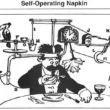Preface: A word about the law and the press.
It’s safe to say that, thanks to the protections rightly granted journalists in the Bill of Rights, almost nobody ever successfully sues a reporter. The standard of proof is too high and the weight of case law too overwhelming for even blatantly egregious cases to succeed in the courts. That’s because libel requires that one not merely prove inaccurate reporting and damages as a result, but a reckless disregard for the truth motivated by malice on the part of the writer. It’s that last part – the presence of malice – that presents the highest hurdle to clear, as it requires proving beyond a reasonable doubt, often years after the fact, the state of the defendant’s mind.
Which brings us to Susan Antilla.
In 1994, Antilla was a New York Times business writer. In the fall of that year, she learned of a rumor suggesting Robert Howard, head of Presstek, might actually be Howard Finkelstein, a convicted felon known to use various aliases, including “Robert Howard”. Antilla would not reveal the source of the rumor, other than to acknowledge that it came from short sellers of Presstek stock.
A quick word about good journalism.
There’s an easy way to discern a responsible journalist from an irresponsible one: irresponsible journalists are willing to write about rumors. Responsible journalists may investigate rumors, but insist on reporting facts.
Following interviews with 30 people, including Robert Howard himself and his son, in which Antilla found nothing to support the Howard-as-Finkelstein rumor, she opted to write anyway…about the rumor.
The day the story ran, Howard’s attorneys met with Antilla’s bosses, showing them proof of Howard’s identity. The following day, the Times ran something even Gary Weiss acknowledges is exceedingly rare: a correction.
An article in Business Day yesterday discussed rumors affecting the stock of Presstek, an imaging technology company. The rumors suggested that Presstek’s chairman, Robert Howard, might actually be Howard Finkelstein, a convicted felon. Mr. Howard’s lawyers presented The Times yesterday with documents and other information regarding his identity. After inspecting them, The Times finds no credible evidence to support the rumor. Details appear today on page D1.
The Times regrets having printed the rumor.
Needless to say, Howard sued Antilla, claiming defamation and false light invasion of privacy, for which a jury ordered Antilla to pay Howard nearly $500,000 in damages.
Antilla appealed and a panel comprised of three appellate court judges overturned the jury decision, based – of course – on the inability to prove Antilla acted maliciously.
And indeed, it’s unlikely Antilla was motivated by malice. I believe that in 1994, Antilla was motivated by something much more base.
Draw your own conclusions by considering this pattern:
- Falsehoods peddled about a CEO of a company by investors shorting that company’s stock
- A reporter repeatedly told, by those who would know best, that there is no truth to the claims
- The reporter shoehorning a hatchet job into print anyway
In fairness to Antilla, there was one difference between her tactics then and now: in 2007 she knew enough to insulate herself by calling her work “opinion.”



